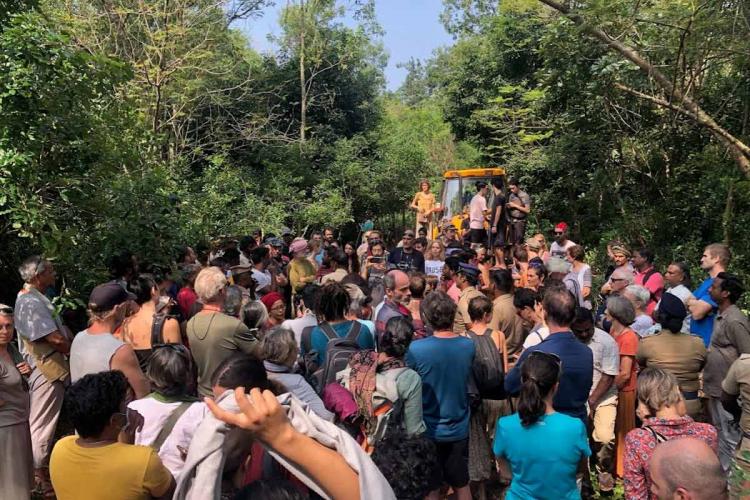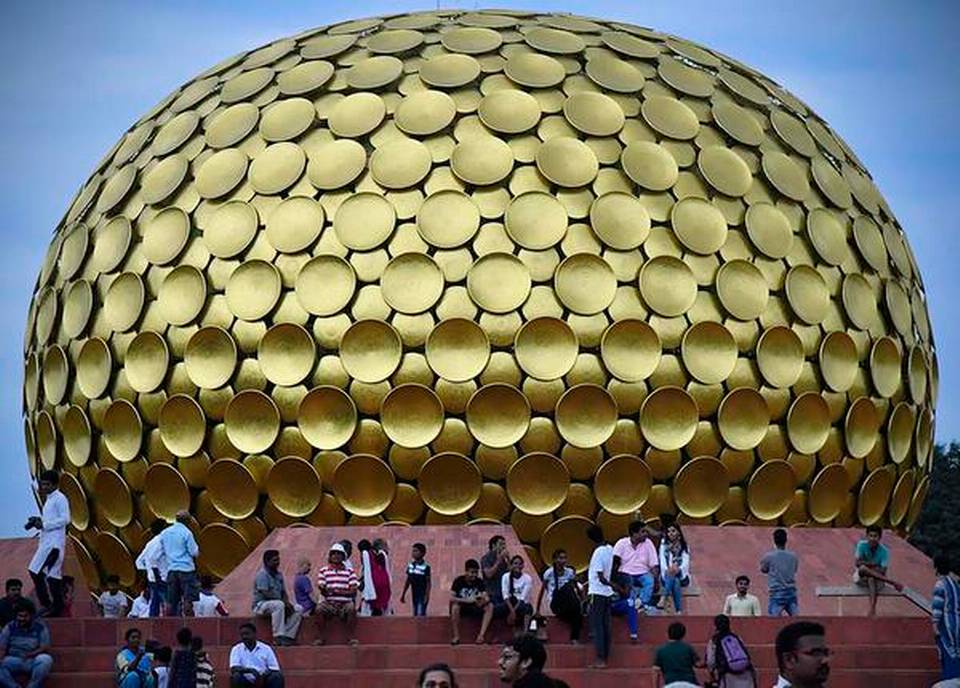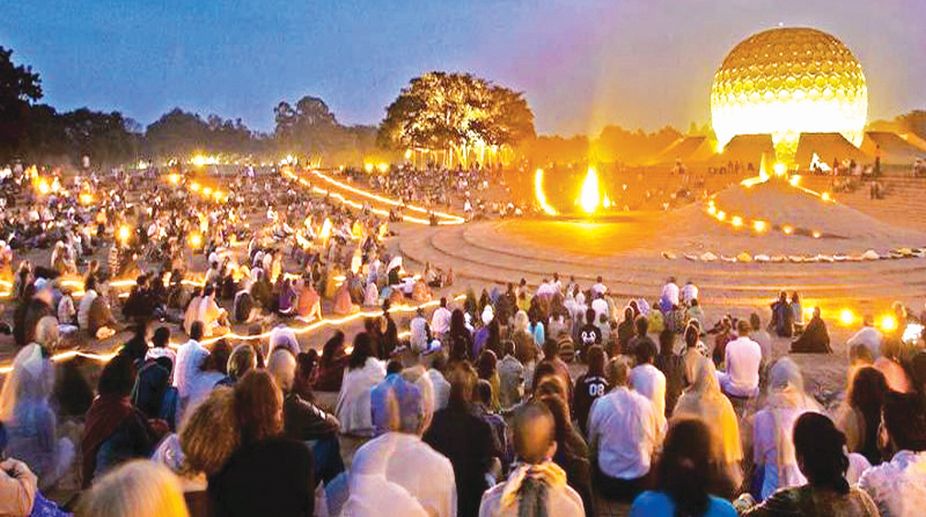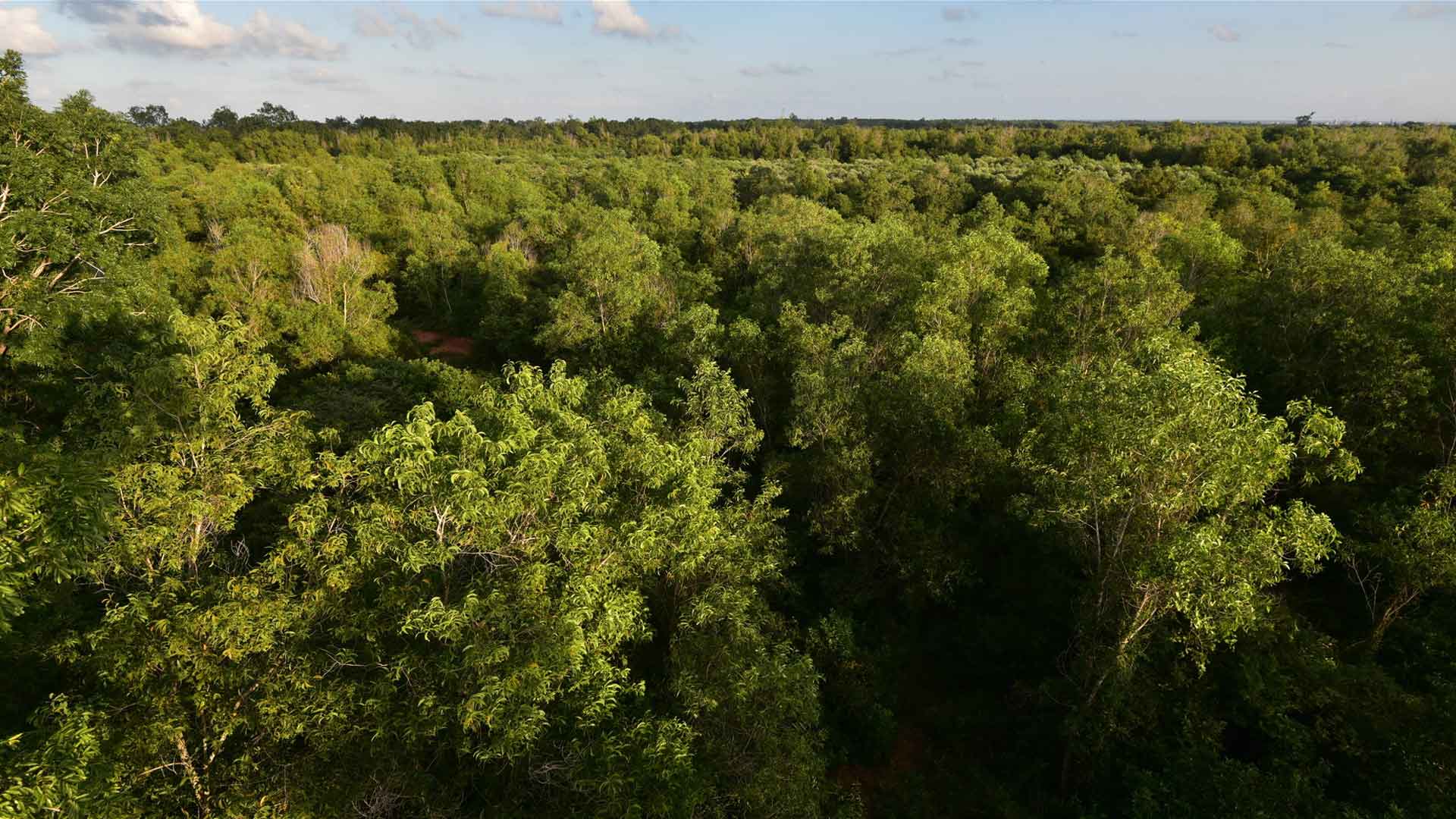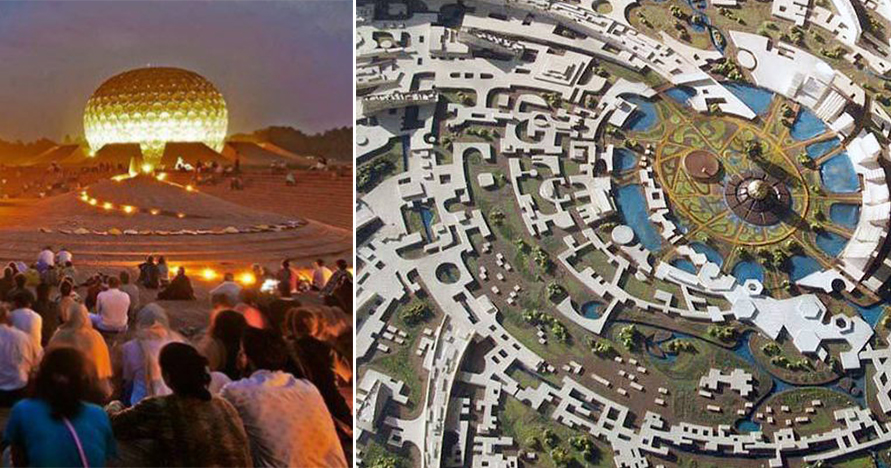Auroville, the utopian community located in the southern state of Tamil Nadu, India, has been a subject of fascination and intrigue for decades. Its unique ideology, which centers around the idea of human unity and spiritual growth, has attracted people from all over the world to live and work together in a shared vision of a better world. However, Auroville’s journey has not been without its challenges, and some critics argue that the community has not lived up to its lofty goals. In this article, we will explore the history of Auroville and examine some of the criticisms that have been leveled against it.
Continue readingThe utopia with no cars: how Auroville is rejecting Indian consumerism” by Vidhi Doshi, The Guardian, August 2018
Auroville, a utopian community located in southern India, is challenging the traditional consumerist lifestyle by embracing sustainable living practices and rejecting the use of cars. In an article published in The Guardian in August 2018, Vidhi Doshi explored the unique way of life in Auroville and the motivations behind its rejection of car culture.
Continue readingPress Note: 58th Meeting of Governing Board, Auroville Foundation
Find attached the preliminary report/ press note of the 58th Meeting of the Governing Board, Auroville Foundation held on 18th January 2022.
Press Note
Auroville Foundation is glad to announce that the 58th Meeting of the Governing Board was held on 18th of January 2022 through hybrid mode.
The meeting was attended in person by Honourable Governor of Tamil Nadu, Shri R. N. Ravi (Chairman), Dr. Tamilisai Soundararajan, Lt. Governor of
Puducherry (member) Dr. Nirima Oza (member), Dr Jayanti Ravi, Secretary, Auroville Foundation and Dr. G. Seetharaman, OSD, Auroville Foundation.
The two ex-officio members (Joint Secretary & Financial Advisor and Joint Secretary (ICC & Vig.), Ministry of Education, New Delhi), Prof. Goutam
Ghosal, Prof. R. S. Sarraju and Prof. Nandana G Basappa attended the meeting through the on-line video mode.
Dr Jayanti Ravi, Secretary, Auroville Foundation, welcomed the Chairman & the Members of the Governing Board and presented the various agenda points
including previous year’s audit report and accounts and reports on the various activities taken up after the last meeting. Dr Jayanti Ravi also gave an update on
the various activities and programmes planned on the occasion of the 150th Birth Anniversary of Sri Aurobindo. After their meeting, the Governing Board met with a few resident groups and with various working groups of Auroville, including the Working Committee, Funds & Assets Management Committee, Auroville Town Development Council, SAIIER and the Entry Board who gave reports on progress made and plans ahead.
AUROVILLE FOUNDATION
Autonomous body under Department of Higher Education
Ministry of Education, Government of India
Auroville -605101, Tamilnadu
Tamil Nadu
Members of the Governing Board also met with International Advisory Council members Ms. Dena Merriam, Ms. Gabi Gillessen, Mr. Hashmukh P. Rama and
Mr. Michel Danino and discussed plans for the growth of Auroville. The Governing Board unanimously reaffirmed its stand on continuing with the expeditious implementation of the Auroville township as per the Auroville Master Plan, and invited all to harmoniously collaborate in its execution.
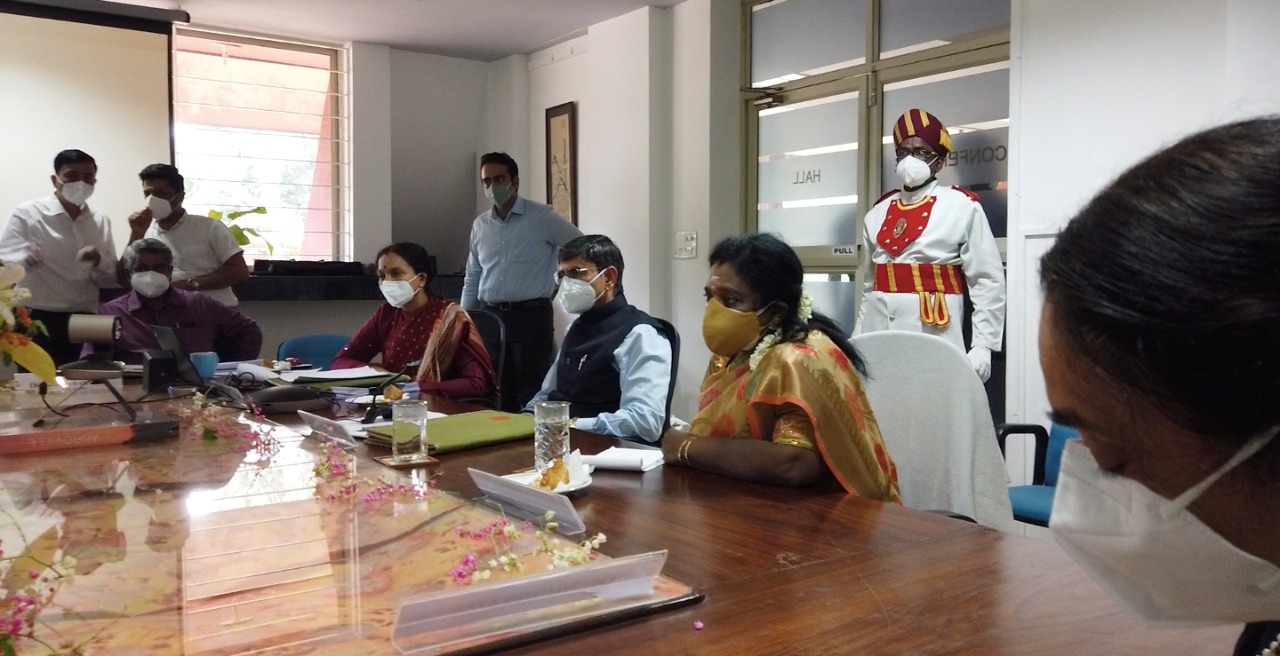
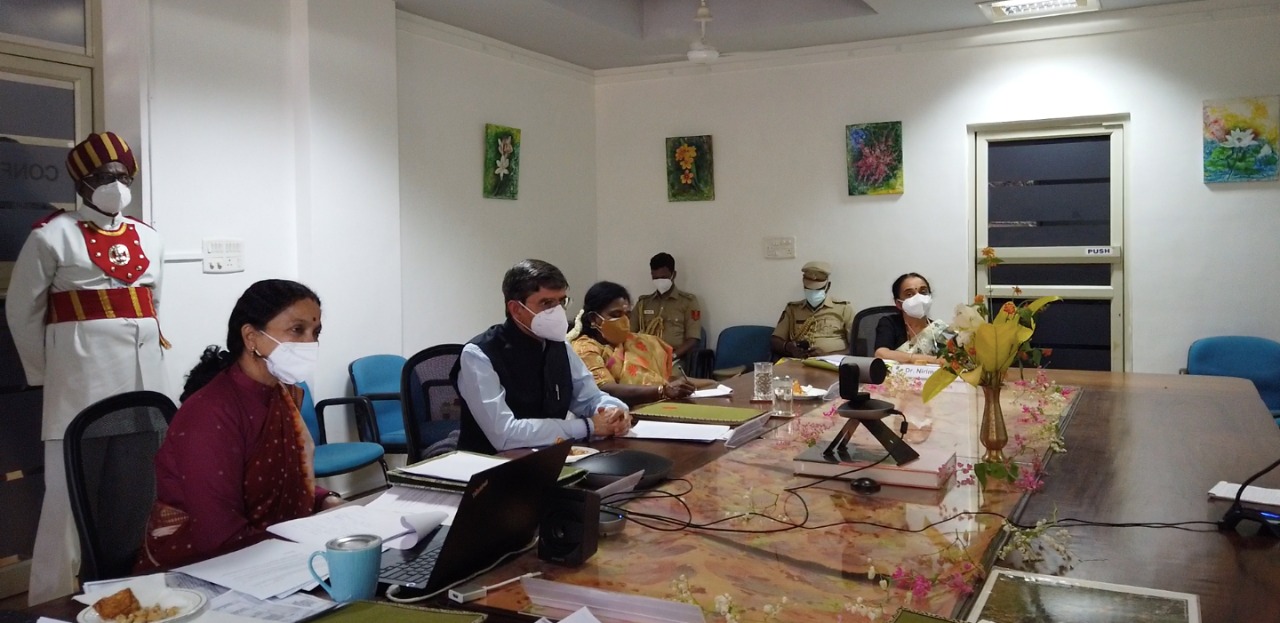
Netaji and Sri Aurobindo: Claims and counterclaims over legacies
Recognition, respect and importance of political legacies are not a simple matter of statues, holograms and flames
Read more at: https://www.deccanherald.com/opinion/netaji-and-sri-aurobindo-claims-and-counterclaims-over-legacies-1074333.html
Continue readingAuroville Foundation says township project to go ahead despite opposition
Residents of Auroville had earlier taken to the streets in protest against the project, stating that trees, bunds and community structures would have to be pulled down for it.
Continue readingNational Herald India: Auroville and the Crown road project: Conflict in paradise
It is unfortunate that this peaceful enclave has been caught in the crosshairs of an intransigent feud that goes against the ideals of both Sri Aurobindo and the Mother
Continue readingThe Guardian: Bulldozers, violence and politics crack an Indian dream of utopia
A blueprint based on ‘sacred geometry’ was designed to build Auroville, a perfect city of unity. But 50 years on the Galaxy Plan has created anger and division
Continue readingResponse of an Auroville Resident to The Observer Article
In response to the article published in The Observer on January 16, 2022, titled “Bulldozers, violence, and politics crack an Indian dream of utopia” by Hannah Ellis-Peterson, I, as a resident of Auroville since 1979, wish to provide some insights and perspectives on the issues raised.
I have been an integral part of Auroville, and I’ve operated a unit producing handmade pottery, which has transformed over the years into what we now call Mantra. I’ve also had the privilege of being a land steward, responsible for caring for about 10-11 acres of land within the city’s boundaries. It is important to note that this land plays a role in the context of the “Crown,” a designated area within Auroville.
It has been evident since my arrival in Auroville in 1979 that this land would eventually need development. I’ve been cautious not to plant anything of high value or create issues for future development, a situation that has begun to unfold 42 years later. The land I’ve looked after is characterized by gravelly terrain with a deep ravine. I’ve contributed to its recovery by fencing it off, preventing grazing and tree cutting, and actively engaging in conservation efforts. This approach has been adopted by many land stewards across Auroville. Land stewards have traditionally been individuals who work during heavy rains to divert water flows to enhance conservation efforts. This organic process has been crucial in making Auroville the green haven it is today.
However, there is a divide in perspective within Auroville. While some residents believed that a focus on reforestation would delay or prevent the development of a relatively dense urban area, others were aware that urban development was a part of the long-term plan.
Auroville’s master plan envisions a circular city with spiral arms, referred to as the “Galactic Plan.” The mid-to-late 1990s marked the point where it became clear that laying underground infrastructure, particularly water pipes, was essential. Drilling individual wells wherever necessary was no longer sustainable, as we needed to limit water extraction and prioritize conservation.
Auroville’s unique criterion is that it belongs to all of humanity and, therefore, no one can have individual ownership of land. All Auroville lands are vested in the Auroville Foundation, a corporate body established by the Auroville Foundation Act of 1988, an Act passed unanimously in the Indian Parliament.
In 2012, Cyclone Thane devastated the area, causing extensive tree loss and prolonged electricity outages. This event prompted Auroville to initiate the underground placement of electrical infrastructure. The plan includes harnessing wind energy and distributing it to Auroville. The installation of cables and optical fiber cables initiated a debate between those focusing on geometric perfection and those advocating for environmental preservation.
While the removal of a few trees raises concerns, Auroville residents possess the expertise to mitigate the impact through reforestation efforts. Replacing a 30-year-old tree with a sapling, placed in a suitable location, can ensure that it thrives unhindered. As Auroville moves forward with denser construction, it is important to consider the broader perspective of building the greenest city on Earth.
It is not my intention to write an extensive article on Auroville, but I believe it is essential for journalists to gather in-depth knowledge and information before expressing the opinions of a specific section of Auroville residents.
I recall that in 1996, a group of residents intentionally occupied the circular service road area and planted indigenous trees. Some residents also transformed a catchment pond into winding footpaths along the Crown’s line. It seems contradictory to now claim environmental degradation by developers when some residents participated in similar activities in the past.
In conclusion, it is my hope that responsible journalism maintains high reporting standards and avoids perpetuating a one-sided narrative.
Regards,
Nobody in Particular
Wall Street International: Bulldozing a dream?
Auroville’s importance as an experiment in alternative living.
Continue readingLawbeat.in: “Mere internal squabble that has been brought to the NGT”: ASG Shankaranarayanan in Auroville Crown Road Case
- Thyagarajan Narendran
- 09:14 PM, 06 Jan 2022
Additional Solicitor General R. Shankaranarayanan representing the Auroville Foundation today submitted that the dispute in Auroville regarding the felling of trees for laying the Crown Road is merely an internal squabble between two opposing parties of the township and that it does not warrant the interference of the National Green Tribunal.
When the hearing of the matter began, Shankaranarayanan took the tribunal through the pleadings and submitted that the petitioner is well aware that it is merely a construction of roads, however, the petitioners have dragged the issue to the tribunal for no apparent reason. He further submitted that as per the procedure laid down in the Auroville Foundation Act, 1988, the plans were placed before the residential committee and permission was duly granted by the committee. However, the petitioners are contending that the plans subsequent to the approvals of the governmental authorities were not placed before the committee and that it is not contemplated that they should do so.
Shankaranarayanan argued that what was being laid is not an expressway or a State High way but merely a pathway. He argued that the burden of proof to show that a reserved forest was being destroyed is on the petitioners. The Bench however told the ASG that in case of environmental matters, reverse burden applies. The ASG replied to this saying reverse burden applies only when the petitioners have established a prima facie case and not under any other circumstance.
The ASG submitted that the land was barren land and trees were planted in order to battle soil erosion and there was no existing forest prior to that. He further questioned the bonafide of the petitioners asking how their homes would have been constructed if not for felling a few trees.
The ASG submitted that the prayer of the petition seeks directions and a mandatory injunction which is in fact in the nature of a specific performance thereby making it a civil dispute. The ASG further submitted that the petitioners initially sought directions, then they changed their stance to seeking approval from the Town Planning committee thus not having a uniform prayer. The ASG submitted that a street to grant access to a place is not a development, it is merely an easement.
On the argument of the petitioner stating that the road could be deviated to save the trees, the ASG submitted that it will amount to expanding the scope of the petition and that more trees might have to be felled for that purpose since 90% of the construction has already concluded. The ASG further submitted that the revenue records make it clear that these were not forest lands and these were agricultural lands and that it does not come within the purview of NGT. The ASG concluded by saying that the petitioner was having a shack that was demolished for the purpose of laying the road, now that there is an interim order he has rebuilt the shack.
Nithyaesh Natraj, the Advocate, appearing for the intervenors in support of the project submitted that there has been no demonstrable environment issue and that the petitioners have been shifting their arguments from time to time. This is the case where all the lands are owned by Auroville which is deemed to be a State under Article 12 and that the activities of the State are deemed to be fair unless there is a prima facie violation of rights.
He further submitted that the project was first approved in 2001, if the petitioner was so aggrieved he could approach the NGT when the NGT act came into force in 2010. However, the petitioner has waited till 2021 to approach the tribunal just because his shack has been demolished. He submitted that the shack which has been reconstructed now is being used for all nefarious activities.
Natraj argued that each family most of whom are not Indian in Auroville occupies one acre of land for their residence, enjoy free food and other amenities all because Auroville receives substantial funding from the central government. He further submitted that none of Gram Panchayats in India enjoys such luxuries and now that there is a threat to that one acre being encroached for laying this road they have approached the tribunal.
Natraj submitted that all is not well with the organisation that is Auroville and its residents and that it
The grievance in the application was that the Auroville Foundation (respondent) was engaged in cutting large scale trees from the Auroville Forest area which has its own biological diversity and eco-sensitiveness.
The Counsel appearing for the applicant had relied on certain newspaper reports to convince regarding the location of the area with a large number of trees and the manner in which cutting was done by using heavy machinery.
Though certain objections were raised before the authorities, no action had been taken by the authorities which prompted the applicant to file the application, claiming to be an environmental activist to protect the Auroville Forest area against destruction, sought-following reliefs:
a. Direct the 1st respondent to prepare a Detailed Development Plan including a mobility plan which is based on and respects the present-day ground realities, to be approved as mandated in the Master Plan and implement projects based on such plan after necessary impact assessments and feasibility studies in an environmentally sustainable manner.
b. Direct the respondents to pay costs to the applicant.
c. Issue such other orders as it deems fit in the interest of the case and renders justice.
The Counsel appearing for the State of Tamil Nadu had submitted that,
“Tamil Nadu Government has no interest in this matter. Though part of the area is falling within Tamil Nadu the area where activities are going on is exclusively in the possession of the 1st respondent- Auroville Foundation and high dignitaries are at the helm of affairs of the administration of the Foundation.”
On perusal of the facts stated the Bench was satisfied that there arose a substantial question of the environment as to whether any permission is required under the Forest (Conservation) Act, 1980 for cutting trees from an area which can be treated as a ‘Deemed Forest’ under the Forest (Conservation) Act, 1980. As a result, the matter was admitted.
Considering the urgency of the matter, the Bench felt the need to pass an ex-parte interim as if no interim order was passed then it was likely to cause greater damage to the environment.
“Even under Order 39 Rule 1 read with Section 19 (4) of the National Green Tribunal Act, 2010, if Court is satisfied that there arises an extraordinary circumstance which requires the Tribunal to exercise the discretion of issuing an interim order without hearing the other side, then Court can issue such order in order to protect and preserve the property which is said to be under danger,” noted the Bench.
The counsel for the petitioners submitted that he needs some time to reply to the arguments of the respondents. The bench has now posted the matter on Monday for the reply of the petitioner.
Case title: Navroz Kersasp Mody & Anr Vs The Auroville Foundation


